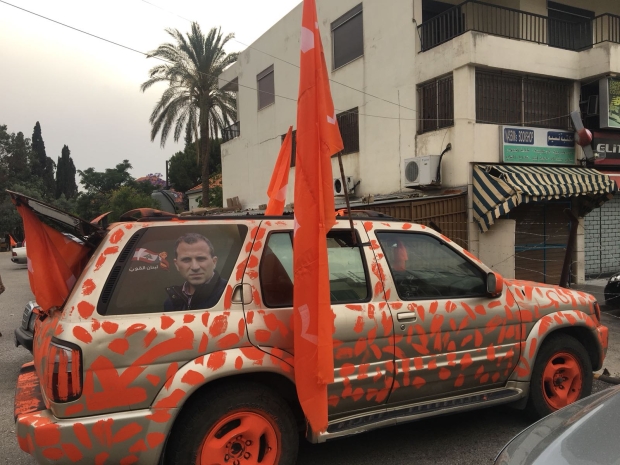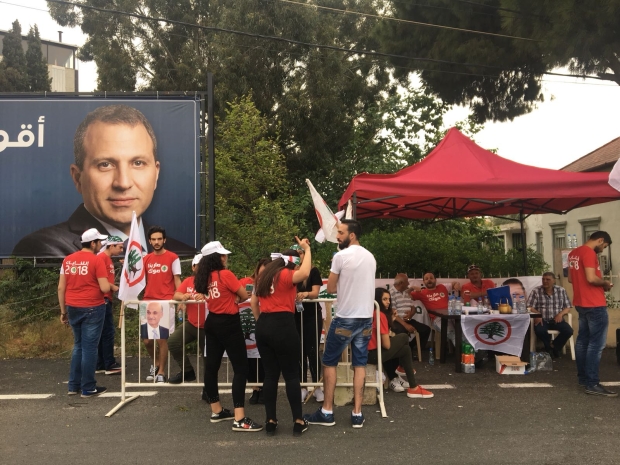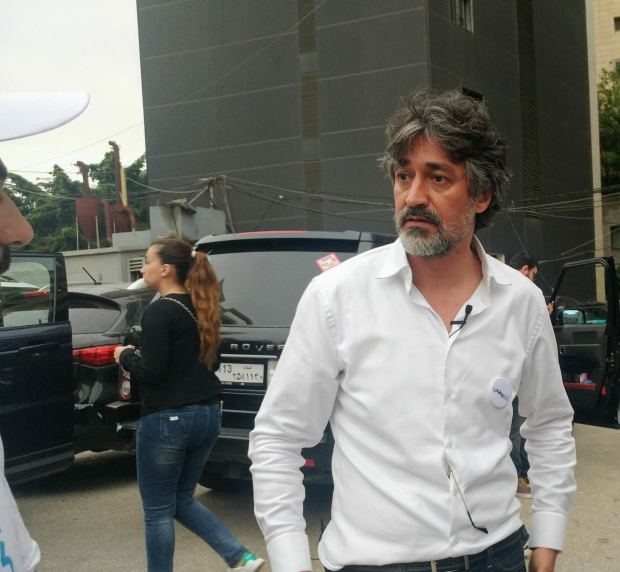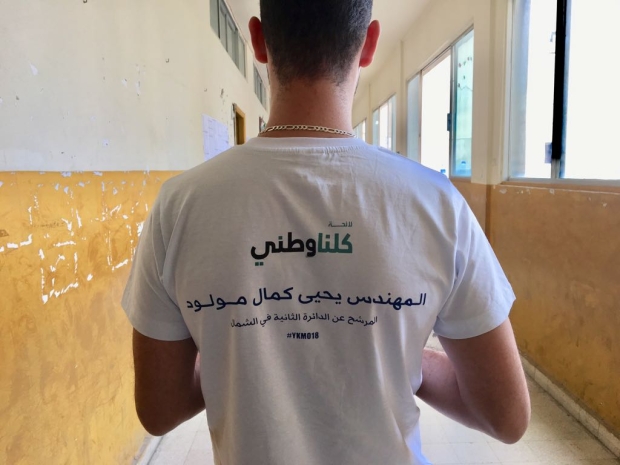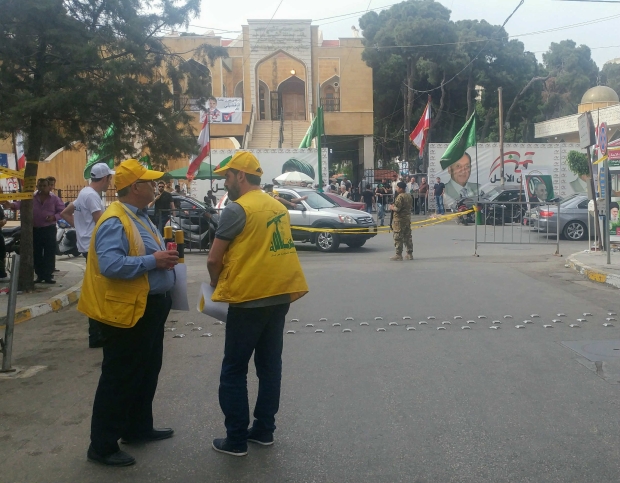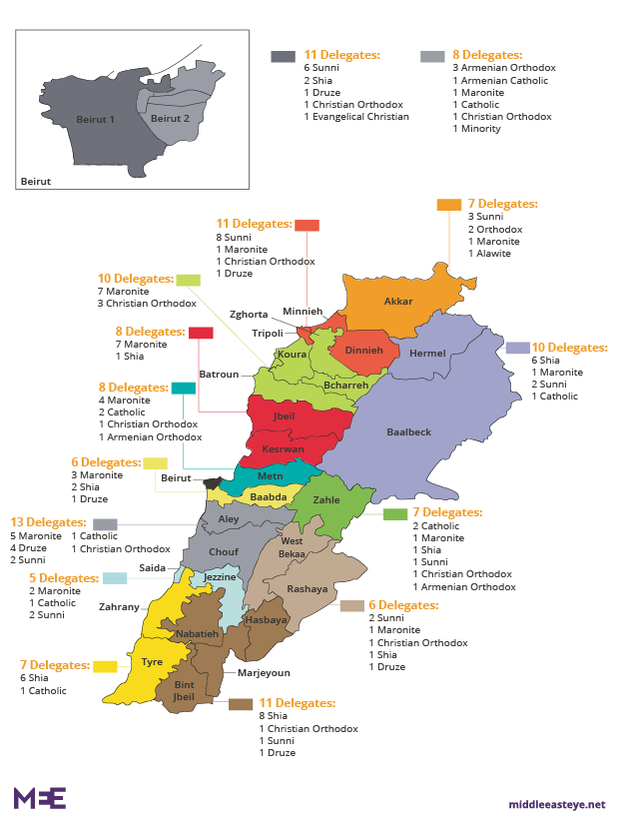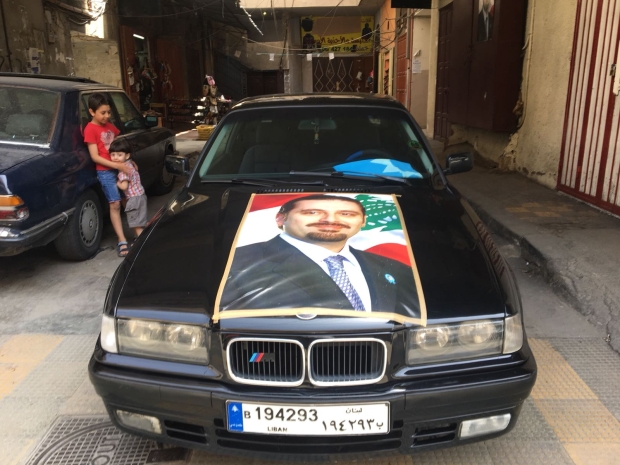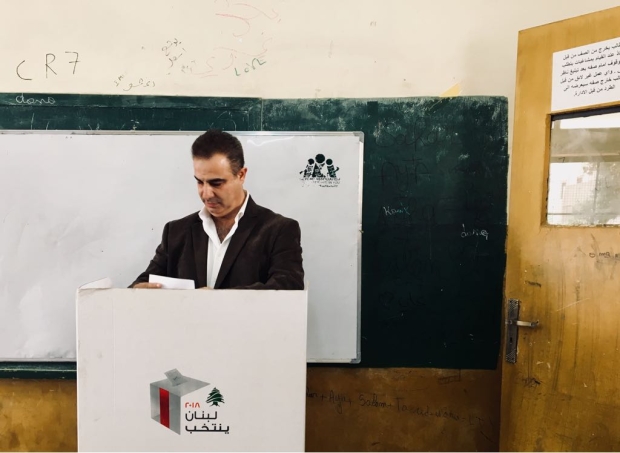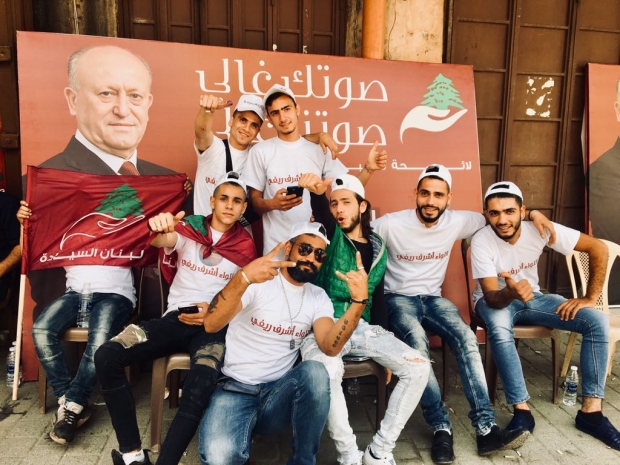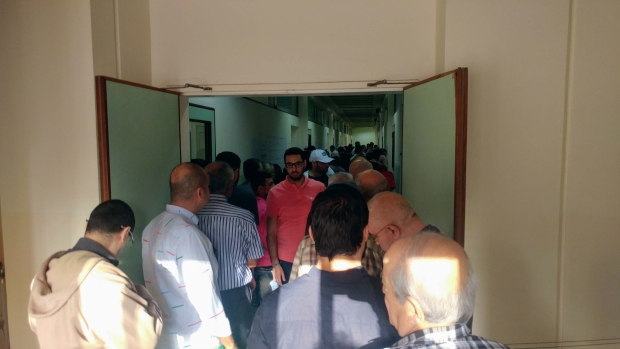LIVE: Lebanon holds first parliamentary election since 2009
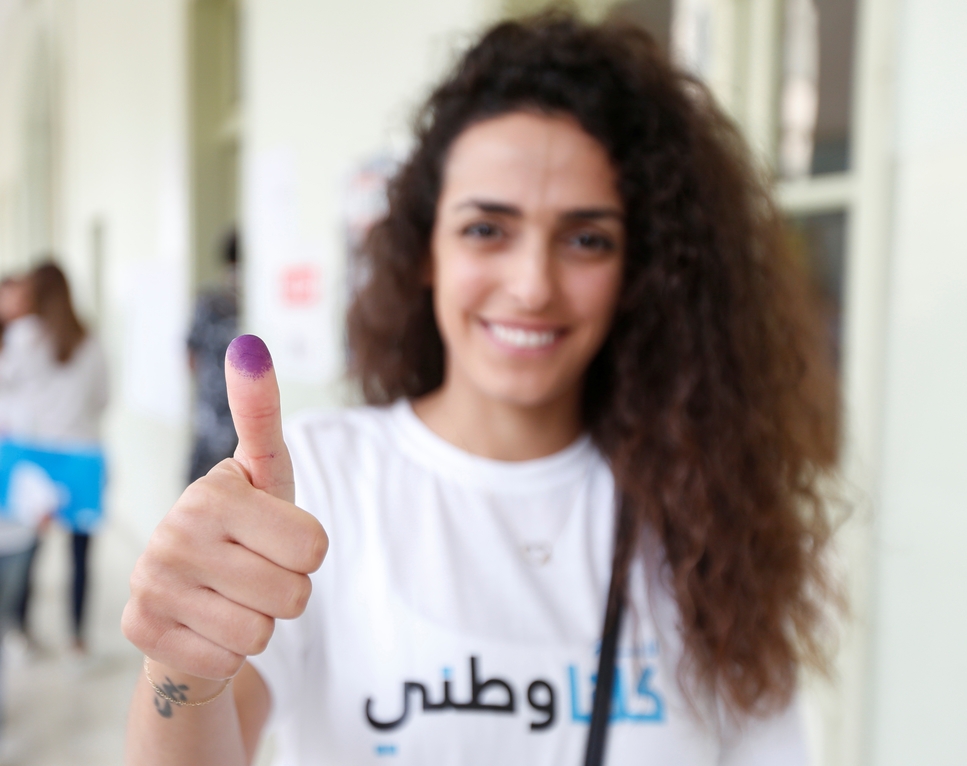
Lebanon heads to the polls for the first time in nine years to vote in Sunday's parliamentary elections.
From the Syrian civil war sending shockwaves through its diminutive neighbour to the temporary resignation of Prime Minister Saad Hariri in Riyadh, a lot has happened in Lebanon since the last general election and much has changed.
Our man on the ground, Ali Harb, will be driving across Beirut, speaking to voters and bringing you all the colour of polling day, with Chloe Domat doing the same up in the north's Tripoli.
Feel free to leave comments and news tips below on Twitter @MiddleEastEye and Facebook.
Photo: A woman shows her ink-stained finger after casting her vote during the parliamentary election in Beirut, Lebanon, (Reuters)
Live Updates
The interior ministry has announced that voter turnout stood at 46.88 per cent at 6 pm.
Though the number will surely rise somewhat, that's significantly lower than the almost 54 per cent in 2009, and perhaps surprising for Lebanon's first parliamentary election in nine years, though apathy over politics in the country shouldn't be underestimated.
Chloe Domat has left Tripoli and headed down the coast to the predominately Christian town of Batroun, which is witnessing a fierce contest between some of Lebanon’s most prominent Christian politicians.
Batroun, along with Bcharre, Zghourta and Koura, make up the North 3 electoral district, where three major lists are competing: the FPM vs the LF and Kataeb vs the Marada Movement and independent politician Boutros Harb. Each list has a heavyweight politician behind it who not-so-secretly hopes to become president one day.
All eyes are on Gebran Bassil, President Aoun’s son-in-law, foreign minister and president of the FPM. Bassil has previously failed to gain a seat in parliament, and is desperate not to repeat the trick this time around. Things seemed to be going in his favour in Batroun, where the participation rate stood a little above 50 per cent at 6 pm.
"I voted for him because he is a heavy worker and I am sure he will improve a lot of things in Batroun," Dany, a 40-year-old supporter of the FPM, told MEE.
Some voters believe the new electoral law was designed to make him win.
"It’s impossible for him to lose with the proportional system and that is unfair. I voted for the Lebanese Forces, my family always supported them, but this time I don’t think we can win," said Dana, a 22-year old-waitress from a village nearby.
An election in Lebanon wouldn't be an election without some elements of scandal.
As mentioned before, things in a polling station in Choueifat got heated, to say the least, with voilence breaking out and a polling box being smashed. A short video of the scene can be seen here:
Meanwhile, another video has emerged from north Lebanon which appears to show Future Movement supporters handing out cash in order to encourage people to vote for the party. As reported earlier, Chloe Domat spoke to people in the northern city of Tripoli who predicted such behaviour. The video in question can be seen here:
Elsewhere, Myriam Skaff, who leads the Popular Bloc, accused the Lebanese Forces of systematically targeting and physically assaulting her supporters in the Beqaa Valley city of Zahle.
In a news conference, Skaff accused the Lebanese Forces of reverting to its civil war-era practices, when the group operated as a brutal right-wing militia.
She said she had been submitting complaints to the state all day long, but security forces did not respond.
"We had hoped for this day to pass in a civilised way, but unfortunately we have seen some unacceptable things," she fumed.
The Lebanese Forces dismissed Skaff's accusations, saying that its own members had been hospitalised after being assaulted by supporters of the Popular Bloc.
Voting has ended across Lebanon, except for those still queueing in polling stations, as assured by President Michel Aoun.
The interior ministry has not offered any nationwide information on voter turnout since 2 pm Beirut time. It wasn't looking good at the time.
In east Beirut, Kollouna Watani candidate in Gilbert Doumit told Ali Harb that he rejected the proposal to extend voting time because of low turnout, likening the idea to renewing the mandate of the political establishment.
"It's true that turnout is low. But in this low turnout, we are very close to them," the civil society candidate told MEE. "There's high participation from our end. That's why they want to extend two hours for themselves."
Indeed, in a Gibran Tueni high school, which is serving as a polling station, campaigners were more numerous than voters.
Doumit said "our lives" are at stake tonight.
"We are going through the worst time economically, politically, socially, democratically. We cannot repeat four more years like the years that have passed, no matter what happened," he said.
Doumit spoke of massive organisational lapses on election day.
With voter turnout struggling, Hezbollah's deputy head Naim Qassem said his party is in contact with the interior ministry over the possibility of extending the voting deadline beyond 7pm.
Hezbollah's number two was speaking in Beirut's Zoqaq al-Blat as he cast his vote.
In other news, MEE's Ali Harb has noted the amount of waste left by campaigners across Beirut.
Lebanon is suffering under a severe trash crisis, which spiralled into large, violent protests in 2015. All parties, particularly civil society ones, have promised to tackle the country's inability to deal with its own waste.
Lebanese President Michel Aoun has announced that voting will be extended beyond 7pm for those already at polling stations. Turnout is low, and that is clearly worrying Lebanon's political class.
Independent candidates should be concerned as well, as in many districts their success depends on mobilising voters to reach the thresholds of support needed to be eligible for seats. For more information about Lebanon's confusing, revamped and Byzantine electoral law, read more here...
Lebanon has introduced a new proportional representation system for its parliamentary elections.
This move could open the door for smaller parties to make it into parliament.
While some have praised the move, the new election procedure consists of several legal stipulations, including the preferential vote and sectarian allocations, which make it the most complicated in the country's history.
Chloe Domat in Tripoli reports that two civil society lists are facing off against the big four Sunni leaders’ lists in northern Lebanon.
Unlike their competitors, they don’t have the means to pay bribes or even put up posters, but they firmly believe there needs to be a change.
"I am about to go abroad to find a job, but I still have a little bit of hope for this country, some hope that change can be real," Samir, a 22-year-old student who supports Kollouna Watani, a civil society coalition who presented lists in nine of Lebanon’s 15 electoral districts, told MEE.
Samir and the other supporters of civil society lists want to remain discreet. In one polling station, a woman who wished to remain anonymous told MEE that she agreed to be a delegate for one of the big candidates, who offered her $200 - but she actually voted for the civil society candidates.
"There needs to be some change. The same politicians and their sons have been mocking us for tens of years, what good did they bring? We need new faces," she said.
Read more about how civil society groups are attempting to challenge the status quo politics of Lebanon.
A civil society candidate in south Lebanon's Bint Jbeil was threatened by supporters of Hezbollah and its Shia ally the Amal Movement, Lebanese news website Al-Modon has reported.
Lina Hmayed, who is running on the Kollouna Watani slate, was reportedly unable to leave the precinct for several hours after casting her ballot. The list's observers were also kicked out of the polling station.
A Hezbollah campaigner in Ghobeiri, south Beirut, told MEE that the group respects democracy and never targets or intimidates opposing candidates.
"Everything is going smoothly," the campaigner, who identified himself as Abu Hadi, said.
Late last month, anti-Hezbollah candidate Ali Amin was attacked by the party's supporters in his southern hometown of Shaqra.
Hezbollah has framed the incident as a heated argument, telling Lebanese media outlets that it is not responsible for the behaviour of the individuals involved.
In Ghobeiri, a Hezbollah stronghold, the streets were almost vacant on Sunday. Most residents in the area are originally from the south or the Beqaa Valley. It appeared that most people in the area had gone to their villages to vote.
"We will elect whoever serves the people best," Zeinab Karma, a voter in Ghobeiri, told MEE.
Meanwhile, reports are emerging that things have got a bit heated in Choueifat, just south of Beirut
According to the interior ministry, voter turnout is around 24.47 per cent with just a few hours of voting left to go. Polls are set to close at 7pm Beirut time.
In 2009, voter turnout stood at just under 54 per cent, so as things stand this time around far less Lebanese are expected to take part compared to nine years ago.
This could be especially damaging for Hariri's chances, for whom mobilising support is of the upmost importance if he is to limit his bloc's losses in parliament.
Challengers like Rifi, wavering Saudi support, financial difficulties and a number of compromises with traditional foes the FPM and Hezbollah have chipped away at Hariri's support. Read more here...
Tripoli is home to some of the country’s poorest people. Once boasting a vast infrastructure network, including an airport, a port, a train station and an oil refinery, today only the port is still in service.
The most deprived districts are the Jabal Mohsen and Bab al-Tabbeneh neighbourhoods. People there told MEE they believe the unemployment rate to be around 80 per cent.
"I don’t want to beg for money from politicians anymore, I want to be represented by someone who will really boost economic activity here and create jobs. But for now that is not an option," said Ali, a 37 -year-old from Jabal Mohsen who will vote for the Future Movement list.
"Honestly, people will vote for whoever pays the most. This is how you think when you are poor and you can’t feed your children. What else can we do? Take a boat to Europe?” asked Sleiman, sitting next to him.
"Personally, I like the ideas of civil society candidates, but I met with someone from the Future Movement and he told me that if I put up posters for his list and open a little bureau on the day of the elections, he would find a job for me. He runs a big hospital nearby and has helped me in the past so I believe him. What other choice do I have?" he said.
In the polling stations of Jabal Mohsen the participation rate was around 20 per cent at 1pm. Delegates from the parties inside the bureaus believe that people will rush to vote later in the afternoon, when bribe money comes.
Unsurprisingly for a city just 30 minutes from the Syrian border, Tripoli has been greatly affected by the war next door. The conflict has at times spilled into open clashes between residents of the majority-Sunni neighbourhood Bab al-Tabbeneh and those of Jabal Mohsen, who share Syrian President Bashar al-Assad’s Alawite sect.
Happily, Tripoli has been stable for some time now, and after a spate of battles and bombings in the early years of the war the city has largely settled back into normal life. Yet for many Sunnis of Lebanon’s second city, Hezbollah’s involvement in the war on behalf of Assad’s government has been a subject of much resentment.
In 2016, Ashraf Rifi emerged as a central figure in Tripolitan politics after resigning as justice minister in a protest against Hezbollah, subsequently doing well in 2016’s municipal elections by portraying himself as the one who would restore Tripoli’s strength and Sunni dignity in the face of the Shia party.
"He is a man of justice, someone who will protect the Lebanese state," Badr Eid, a candidate on Rifi’s list, told MEE while he was voting in Jabal Mohsen.
Rifi’s affiliation with Saudi Arabia is a secret to no one. In the centre of Tripoli, gigantic billboards show him posing with Saudi officials.
"We have to stand with Saudi Arabia to face Hezbollah," said Hajj Sharafeddine, who is responsible for one of Rifi’s offices. "They are not yet in Tripoli but they control the state."
Interior Minister Nohad Machnouk, who is overseeing the elections, has acknowledged the lack of adequate accommodation for physically disabled voters. Machnouk blamed a group of ministry employees who were tasked with addressing the issue while preparing for the elections.
He said he has reprimanded those workers for their failure.
"I admit that there was a shortcoming," he said at a news conference, adding that disabled Lebanese should have been able to practice their right to vote like all other citizens.
Many polling stations are in buildings' higher floors, with no elevators or wheelchair access.


